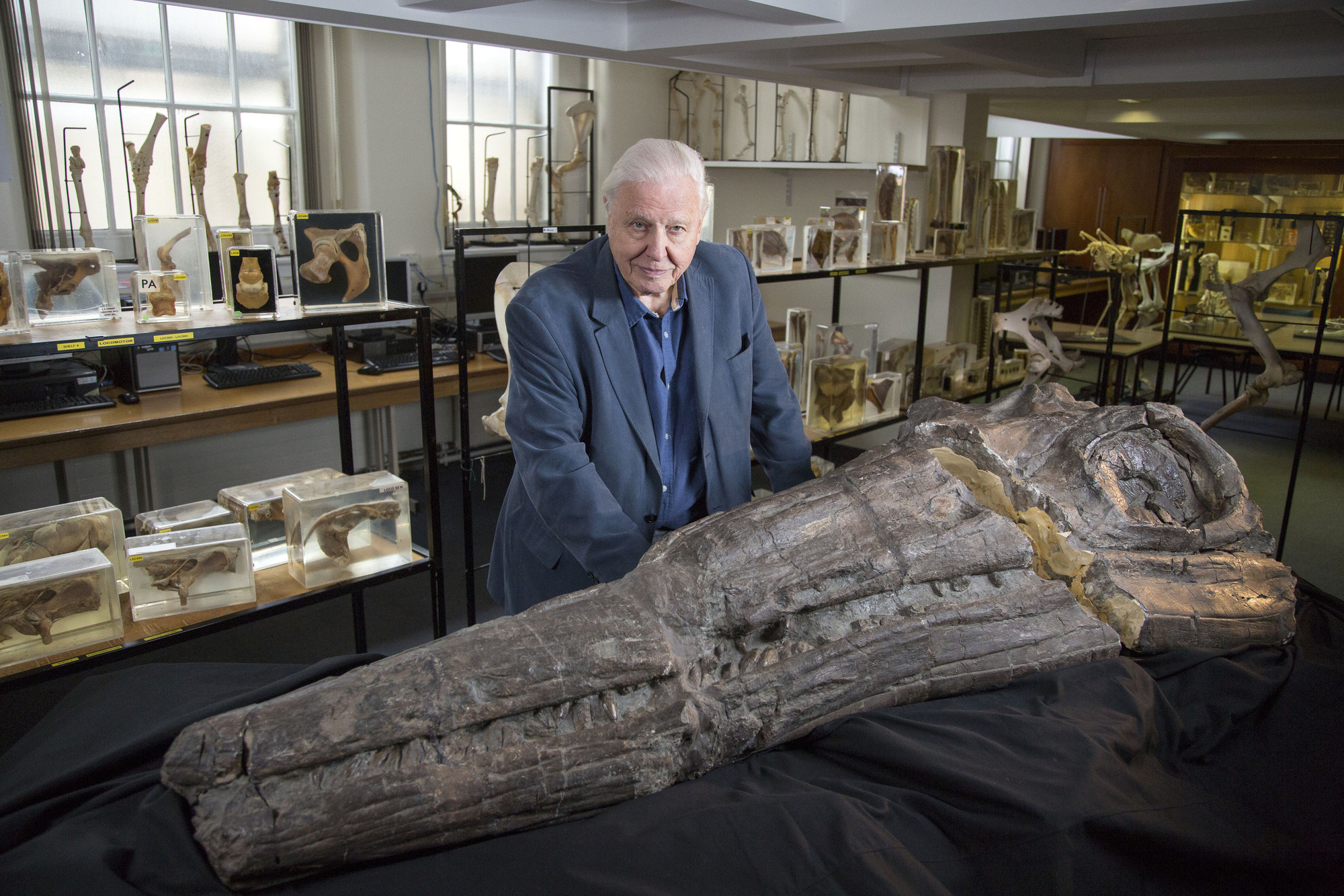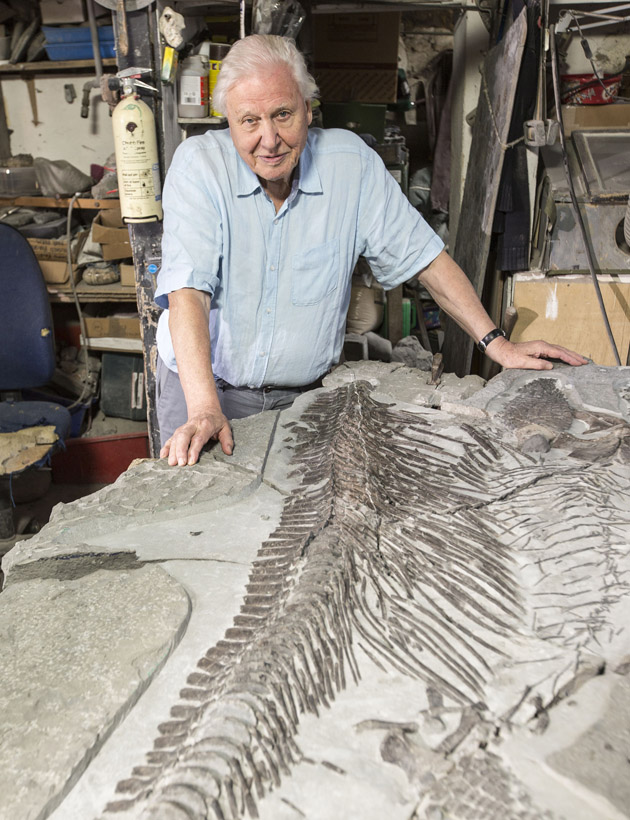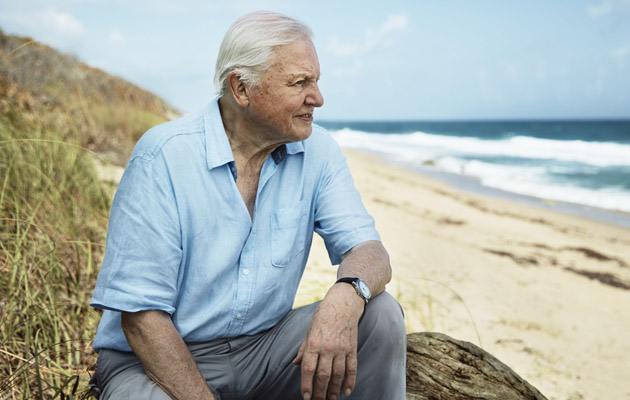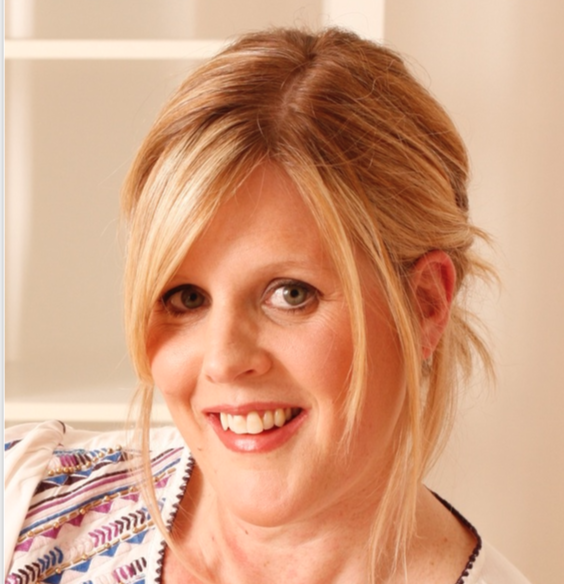Attenborough and the Sea Dragon: 'I have the best job in the world!,' says Sir David

The latest updates, reviews and unmissable series to watch and more!
You are now subscribed
Your newsletter sign-up was successful
Want to add more newsletters?

ONCE A WEEK
What to Watch
Get all the latest TV news and movie reviews, streaming recommendations and exclusive interviews sent directly to your inbox each week in a newsletter put together by our experts just for you.

ONCE A WEEK
What to Watch Soapbox
Sign up to our new soap newsletter to get all the latest news, spoilers and gossip from the biggest US soaps sent straight to your inbox… so you never miss a moment of the drama!
Sir David Attenborough - pictured with a Temnodontosaurus skull - uncovers the secrets behind a fascinating sea dragon fossil found off the Dorset coast and reveals why he thinks he has the best job in the world
When the giant front flippers, or "paddles", of a prehistoric sea dragon called an ichthyosaur, were found on a beach along the Jurassic Coast, it was a huge scientific breakthrough. Not only was the fossil huge in size, but experts were convinced the rest of the creature was still buried under the rocks.
Now, in a new BBC programme, Sir David Attenborough join forces with fossil hunter Chris Moore and his team as they race against time to excavate the fossil from the rapidly eroding Dorset cliffs and meet scientists who reveal how this huge creature lived and died.
Here Sir David talks fascinating fossils, dream destinations and reveals why he thinks he's got the best job in the world...
Sir David Attenborough's TV Times interview
TV Times: How did this new programme come about?
David Attenborough: "I’d heard about these strange paddles early on from talking to Chris. He was saying ‘I really think this is very strange’ and I thought we ought to follow it up. Chris was pretty sure it was going to be something new. And it turned out to be a whole new species."
TVT: Were you pleased that such a discovery was on our doorstep, in Lyme Regis, Dorset?
The latest updates, reviews and unmissable series to watch and more!
DA: "It’s very exciting. I’ve always known these things are found along the Jurassic Coast but it’s very easy to pick up ammonites whereas picking up bits of ichthyosaur is rather more problematic."
TVT: You were a keen fossil hunter as a boy weren’t you?
DA: "Yes. I went fossil hunting in Leicestershire. I’ve found odd bones in my time but I’ve never found anything of any consequence."

TVT: It was a race against time to remove the fossil from the rocks, was that exciting?
DA: "It is always exciting to follow the excavation to see how far it goes. It went pretty well. It was also very interesting to see an expert analyse the damage to the creature and interpret the crime scene."
TVT: How does making a programme like this compare to filming living creatures in Blue Planet?
DA: "It’s a different process. If Chris said ‘I think we’re going to find something pretty interesting,’ we could be there filming the next day."
TVT: Are there any other prehistoric creatures you’d like to make a programme about?
DA: "Yes, it's great fun but it's a question of how much people enjoy the programmes. I’ve done it about two or three times already so I think that’s about all the great British public can be required to watch."
TVT: Do you think issues arising from your recent series of Blue Planet, like sea pollution, are now being taken more seriously?
DA: "I think Blue Planet is part of a worldwide change in opinion that’s taking place at the moment. Internationally people are aware that we are reaching a crisis point in the health of the sea. People have been talking about plastic in the ocean for 10 years but suddenly the world is listening. The programme is timely but it wouldn’t be true to say that it’s a consequence of what we have done."

TVT: Where do you get the energy and enthusiasm to make such ambitious documentaries?
DA: "There’s a very big team working on these things and I get undue prominence because mine are the words on it. But the producers and the cameramen, they’re the guys who put the energy in. Finding words is not always easy but nonetheless it can’t be compared to the problems that those guys have when they’re chasing fish at the bottom of the ocean."
TVT: Is there anywhere you’d still like to travel to?
DA: "I would like to go to Outer Mongolia or Inner Mongolia and the Gobi desert. There are wonderful fossils in the Gobi desert. I would enjoy that very much. But it’s quite hard going so I don’t suppose I’ll ever manage it."
TVT: Do you think you have the best job in the world?
DA: "It’s unbelievable. People spend their life saving up in order to go to the Galapagos. I’ve been to the Galapagos about 10 times. How lucky can you be?"
Attenborough and the Sea Dragon, BBC1, Sunday Jan 7th, 8pm

Tess is a senior writer for What’s On TV, TV Times, TV & Satellite and WhattoWatch.com She's been writing about TV for over 25 years and worked on some of the UK’s biggest and best-selling publications including the Daily Mirror where she was assistant editor on the weekend TV magazine, The Look, and Closer magazine where she was TV editor. She has freelanced for a whole range of websites and publications including We Love TV, The Sun’s TV Mag, Woman, Woman’s Own, Fabulous, Good Living, Prima and Woman and Home.

